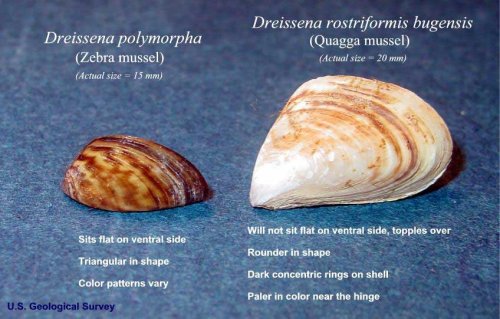
LAKE COUNTY – Tests conducted so far on Clear Lake have shown no presence of the quagga and zebra mussels, but a county Water Resources official said the testing will continue over the coming months.
The two invasive mussels, found earlier this year in Southern California water bodies, have spent several years moving toward the West Coast, as Lake County News previously reported.
Water Resources Deputy Director Pam Francis told Lake County News that the county took samples from Clear Lake earlier this summer and sent them for testing.
So far, the tests have been negative, said Francis, although signs of another shellfish were found.
Francis said the labs – at Portland State University in Oregon and at the Colorado office of the Bureau of Reclamation – still have another set of samples yet to be analyzed.
The county is planning to collect more samples next week, said Francis, in order to look for signs of mussel spawning.
At this time of year, Francis said scientists report the mussels are in their “settling” period, where they attach to materials like concrete.
The county has put out test blocks of concrete – such as would be found on piers – to look for the mussels, said Francis. Quagga and zebra mussels also like dark spaces under piers and concrete. The mussels pull calcium out of the water and concrete to build up their shells.
“We'll be monitoring those for the rest of the winter on a monthly basis,” said Francis.
The hope, said Francis, is to prevent the mussels from getting here.
“If we have them, it's really too late to do anything,” she said.
And it's not just Clear Lake that they're concerned about, said Francis. There's also Blue Lakes, Hidden Valley Lake, Lake Pillsbury and Indian Valley Reservoir to watch.
As far as invasive species go, the county also is dealing with a large recent find of hydrilla, said Francis, which the California Department of Food and Agriculture is working to abate.
There are a number of public outreach efforts now getting under way to raise awareness of the invasive mussels, said Francis.
She said movie theater goers in the coming weeks will see slide shows about preventing quagga and zebra mussels before the main feature.
Caltrans also began installing signs on Thursday, which will continue today, warning those coming and going from the county about not carrying “aquatic hitchhikers,” said Francis. Signs are being installed on both sides of the road along Highways 20, 29 and 175.
Quagga and zebra mussel brochures also will be included in tax bills that will be sent out to county residents who have leases on piers, docks and buoys.
In February, Boating and Waterways sent out a letter to registered watercraft owners warning them about the invasive species, said Francis.
Francis said the county is asking members of the public to observe “good housekeeping,” which primarily means launching only clean boats and watercraft that have been decontaminated by being allowed to dry out first.
These measures, along with consistent monitoring, are critical, said Francis.
“It is so daunting to try to close this lake down or have limited access where boaters have to get stickers or be inspected,” said Francis.
Closing down the lake would be extremely expensive, said Francis, considering all of the public boat launches and private piers.
Decontamination stations cost $100,000 and need to be manned constantly, so the best alternative is prevention, she said. “It's a real challenge.”
Francis said the county is looking to the state for help in keeping the mussel from spreading by quarantining areas where it already has been found.
The opinion of the scientific community and water resources experts is that they need to devote resources to inspecting boats coming into the state at the state's border inspection stations, said Francis.
She added, “I believe that is happening now.”
The Board of Supervisors has asked for an update on the mussels, said Francis, which Water Resources expects to deliver in September.
Water Resources also is hoping to have more test results back soon, Francis said.
Concerns about the mussels, said Francis, aren't going away any time soon.
“This is for the rest of our lives, we're going to have to worry about this mussel,” Francis said.
E-mail Elizabeth Larson at
{mos_sb_discuss:2}

 How to resolve AdBlock issue?
How to resolve AdBlock issue? 



